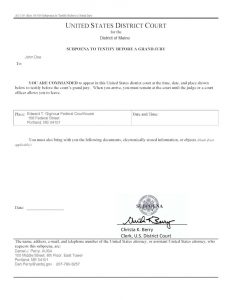Dear Client X,
Thank you for your letter with regards to your notification of potentially being subpoenaed to appear in front of a court of law for civil case Y. While I do understand your concern and angst with regards to this notice, I have prepared a document below with all the information you could need with regards to subpoenas. Starting from simple definitions, to expanded details and nuances of subpoenas.
I hope this document aids in your worries of possibly being subpoenaed. Also, I will be there with you every step of the way and will answer any remaining questions you may have.
Take care.
Sincerely,
Connor Runnalls
Subpoena (a legal order)
A subpoena is when an agency of the law, typically the court system, order’s a witness to testify or produce evidence for the court, with penalties for the failure to comply
Etymology:
The origins of the word subpoena are from early 15th century Latin Sub Pena, which translates to under penalty. Originally, the subpoena was used as a writ (Curtis, 1882) – a form of legal paper – but is now used primarily for witnesses or evidence. The verb currently used today, subpoena, came into use around the 1630s and has been used ever since.
Compare and Contrast:
Subpoena vs. Summons
Subpoenas and summons are both forms of notices by/for a court of law. The most glaring distinction between the two of them is who the notice originates from. On the one hand, there are summons which are official notices of a lawsuit, that are typically to notify one that they are being sued by another party.
On the other hand, subpoenas are court-ordered demands for one to testify in court. Aside from the origins of notice, as mentioned above, while the two do have similarities in that they are both commanding an appearance in court, they serve very different purposes. Subpoenas are to receive information, while summons typically will result in the summoned appearing before a court of law in a case of their own.
Negation:
There are two aspects in which subpoena’s do not require an answer from the witness. Subpoenas require the witness to answer all questioning and fulfill testimony unless that testimony is self-incriminating, or there is privilege involved. What this means is that a witness will not be required to fulfill any part of the subpoena if they would be self-incriminating themselves in any way, or if they feel they must exercise their right to section 13 of the charter, which is essentially Canada’s version of pleading the fifth. Second, if there is a privilege, such that of doctor-patient or other client confidentiality, the subpoenaed will not be required to break such privilege unless they have received authorized consent to do so. Essentially, subpoenas are designed to reveal information, but with limitations, in that those being subpoenaed have protection from breaking legal obligations, or being forced to admit to crimes.
Visuals
Attached below is one of the primary pages found in a subpoena in which important information such as date, time, location, are listed. Standard subpoenas are much greater in length, with page counts ranging anywhere from 12 pages to 60 pages depending on the case (the magnitude of the case, the number of people involved, etc.). Typically, other information found on subpoenas includes information that one will be testifying on, information on documents to present to the court for evidence, as well as punishment for failure to comply.

Curtis, J. C. (1882). A school and college history of England.
Federal Grand Jury Witness Subpoena: The Process, Your Rights. (n.d.). Retrieved from
Federal Grand Jury Witness Subpoena: The Process, Your Rights
R v Nedelcu: The Right Against Self-Incrimination and the Return to the Unworkable Distinction. (2012, November 24). Retrieved from http://www.thecourt.ca/r-v-nedelcu-the-right- against-self-incrimination-and-the-return-to-the-unworkable-distinction/
Subpoena (n.). (n.d.). Retrieved from https://www.etymonline.com/word/subpoena
What is the difference between a summons and a subpoena? (n.d.). Retrieved from
https://www.illinoislegalaid.org/legal-information/what-difference-between-summons-and- subpoena
Leave a Reply